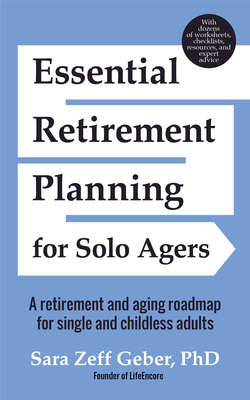Читать книгу Essential Retirement Planning for Solo Agers - Sara Geber - Страница 7
На сайте Литреса книга снята с продажи.
ОглавлениеForeword
This book is for you. Don’t say you’re not a Solo Ager. The truth is, we’re all Solo Agers if we live long enough. Successful Solo Agers have learned how to age alone and they have lessons we all need to learn. This book will give you those lessons.
WAIT! Before you put down this page and get into the book, think a bit about what I’ve just said and take it seriously.
I’m a seventy-three-year-old gerontologist who’s moving, by inches, into old age. I wrote a textbook in gerontology, but I learned more from personal example than I ever did from books. I had the great good fortune, with my wife, to spend seven years caring for our dear friend Larry Morris, who moved into our home and later died in our midst at the age of ninety-seven. As Larry approached his nineties, he had outlived two wives and had no children. He was a Solo Ager and his example remains an inspiration to me.
In the classic novel Goodbye, Mr. Chips, the hero is a man who has spent his life as a humble teacher at a boys’ school. He’s lying on his deathbed when he overhears friends talking about his life, saying it was a pity he never had any children. Mr. Chips pipes up to say “But you’re wrong. I have! Thousands of ’em, thousands of ’em … and all … boys.”
Mr. Chips has spent his life as what we might call an investor in social capital: in the “ties that bind” us together and that make our lives meaningful in the end. Successful Solo Agers are those who have done best at cultivating those ties. That’s the lesson I learned from Larry Morris, who spent so many years of his life giving to others and cultivating friends, including younger friends, like me and my wife.
The Beatles had it down when they sang, “I get by with a little help from my friends.” Those lyrics sound like a cliché, but they aren’t. Epidemiologists are now discovering that isolation and loneliness constitute “the new smoking.” The lack of social ties has a devastating impact on mortality and life expectancy. In short, “going it alone” can kill you. Successful Solo Agers are those who are solo only in certain respects. They are the successful investors in social capital, and this book will show you how to learn from what they already know.
So, whether married or single, childless or with children, we all have to ask the question: Can we learn to be an “investor in social capital?” Yes, we can. Sociological theorists like Robert Putnam (Bowling Alone) can tell you how to do it. As with physical health, when it comes to strengthening social ties, it’s never too late to make up for lost time—and in our overly busy world we all have to struggle against that threat of lost time. Prof. Putnam has warned us about the dangers, as a society, of depleting our social capital. It’s up to us to take that warning seriously.
My wife of forty-eight years and I have two grown children, a son and daughter in their thirties, so perhaps we don’t technically qualify as a “Solo Agers.” But maybe I should say “not yet.” The truth is, as I said earlier, eventually, one member of a couple dies before the other. On a statistical basis, bereavement affects women more than men, but I have more than one close male friend who’s a widower.
Take seriously the idea that you, like me, may one day be a Solo Ager. Never think, as the friends of Mr. Chips did, that it’s a pity you never had any children. Instead, read what this book has to offer and don’t delay a single day in applying its lessons.
—Harry R. Moody, PhD,
Visiting Professor, Fielding Graduate School,
Retired Vice President for Academic Affairs, AARP
Harry “Rick” Moody is the author of over 100 scholarly articles, as well as numerous books on aging. Dr. Moody previously served as Executive Director of the Brookdale Center on Aging at Hunter College and was Chairman of the Board of Elderhostel (now Road Scholar).
His new book, Gerontology: The Basics, will be published by Routledge in 2017. In 2011, he received the Lifetime Achievement Award from the American Society on Aging; in 2010, Masterpiece Living honored him with the Robert Kahn Award for Successful Aging; and in 2008 he was named by Utne Reader Magazine as one of “50 Visionaries Who Are Changing Your World.”
